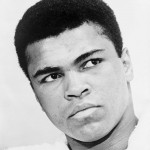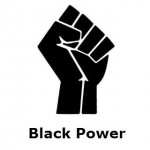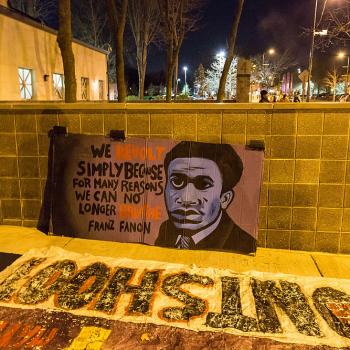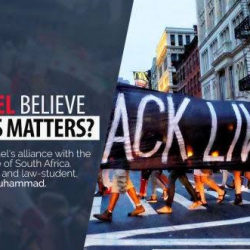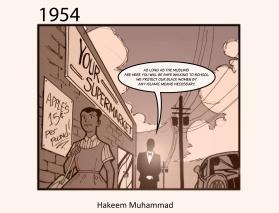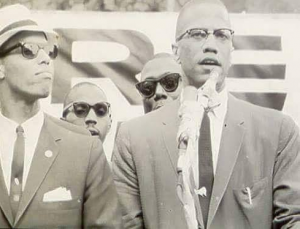
“The Most Merciful, taught the Qu’ran, created man and taught him eloquence.” — 55:1-13
Black Muslims developed an unrivaled oratorical tradition that would convey the grievances of Black Americans and articulate complex concepts covering topics such as history, sociology, and political science in an accessible manner and in a rhetorical style that invokes call and response, rhythm, and contained a voice of profound eloquence and defiance to the powers of white supremacy. In his autobiography, Malcolm states:
“Sister Tynetta Dynear [Muhammad] would speak beautifully….”
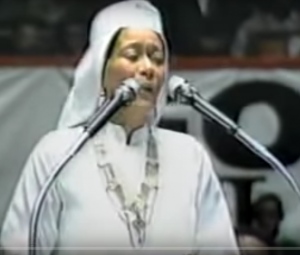
An adherent to this rhetorical tradition, Tynetta Muhammad in a speech at Madison Square Garden tells Black leaders, ”Stop being afraid to stand up on the side of truth and justice…when they have practiced white supremacy for over 430 years butchering our people.”
In an era of Islamophobia in which Muslims are constantly demonized as “terrorists” and in which Muslims leaders are constantly pressured to condemn terrorism, the Black Muslim oratorical tradition never loses site of the number source of terrorism in the world: white supremacy and it never misses the opportunity to condemn it. Malcolm X further states:
At the microphone would be the Nation’s National Secretary John Ali, or the Boston Temple Minister Louis X [Farrakhan]. They enlivened the all-black atmosphere, speaking of the new world open to the black man through the Nation of Islam.
This rhetorical tradition pioneered by Black Muslims sought to enliven Black audiences by boldly speaking against the crimes of white supremacy, instilling in oneself pride in being Black, and rejecting the accommodatist, compromising oratorical style that other civil rights activists utilized, which were aimed to be palatable to white audiences.

Black Muslim oration whether in interviews or public speeches is characterized by profound eloquence and boldness in calling out hegemonic powers. Though this rhetorical style is extremely erudite in its orientation, it avoids pretentious academic language because it seeks to connect and resonate with the masses of Black people.
Mark Lawrence states that the speeches of Malcolm X, a pioneer in Black Muslim oration “was never meant to confuse or flatter, but to speak truth to power.” Farrakhan an heir to this oratorical tradition did just this in his confrontation with Mike Wallace.
After Mike Wallace refers to Nigeria as the most corrupt nation on the earth, Farrakhan asks a series of rhetorical questions, “Has Nigeria dropped an atomic bomb, and killed people in Hiroshima and Nagasaki? Have they killed off millions of Native Americans?”” When asked by Wallace if he could name a country more corrupt than Nigeria, Farrakhan does not hesitate to say America pointing to the systemic oppression of Blacks and Native-Americans. The boldness with which Farrakhan speaks aims at reminding us of the atrocities committed against the non-white world, a key feature of Black Muslim oration.
Malcolm X writes, “The Boston Temple’s outstanding young Minister Louis X[Farrakhan], previously a well-known and rising popular singer called ‘The Charmer,’ had written our Nation’s popular first song, titled ‘White Man’s Heaven is Black Man’s Hell.’”
 It would be this song that Ali would sing when asked about his stance on Vietnam. Ali would later declare he would not fight in Vietnam,”simply to continue the domination of white slave masters of the darker people the world over.” When asked a variety of questions by Michael Parkinson about his political stances, Ali answered each one gracefully and then declared, “Your knowledge is nothing to a Muslim.”
It would be this song that Ali would sing when asked about his stance on Vietnam. Ali would later declare he would not fight in Vietnam,”simply to continue the domination of white slave masters of the darker people the world over.” When asked a variety of questions by Michael Parkinson about his political stances, Ali answered each one gracefully and then declared, “Your knowledge is nothing to a Muslim.”
In saying this, Ali expresses pride in the civilizational legacy of Muslims—in preserving and spreading knowledge from Timbuktu to Cordoba. Proud of this legacy, despite the fact that Ali has far less formal education, Ali believes his Muslim faith makes the interview-debate a total mismatch. Black Muslim oratory is rooted in absolute Muslim pride and full conviction in one’s faith.
Indeed, Farrakhan has often expressed joy about how he and Malcolm X would completely dismantle the arguments of opponents with far higher levels of formal education.
While in prison, Malcolm X who pioneered this rhetorical tradition copied and studied every word in the dictionary. Farrakhan states:“Malcolm was this magnificent orator. He could spit words out so fast; he knew the roots of words. I watched him on so many occasions, I sat under him, I listened, I extracted what all I could.”
As a result, Black Muslim oration is erudite, confident, and eloquent. It incorporates the themes of traditional Black speech: cadence, rhythm, and call and response. It does this all for the sake of speaking truth to power. In this time of deep Islamophobia in which Muslims are increasingly demonized and made to feel humiliated through constant media demonization of their faith, the Black Muslim voice—not just any Black Muslim voice, but one consistent with this oratorical tradition—is needed to boldly indict white supremacy and continue to instill within Muslims both pride and confidence.
—-
In the next article, we will further look at rhetorical themes in Black Muslim oration.

